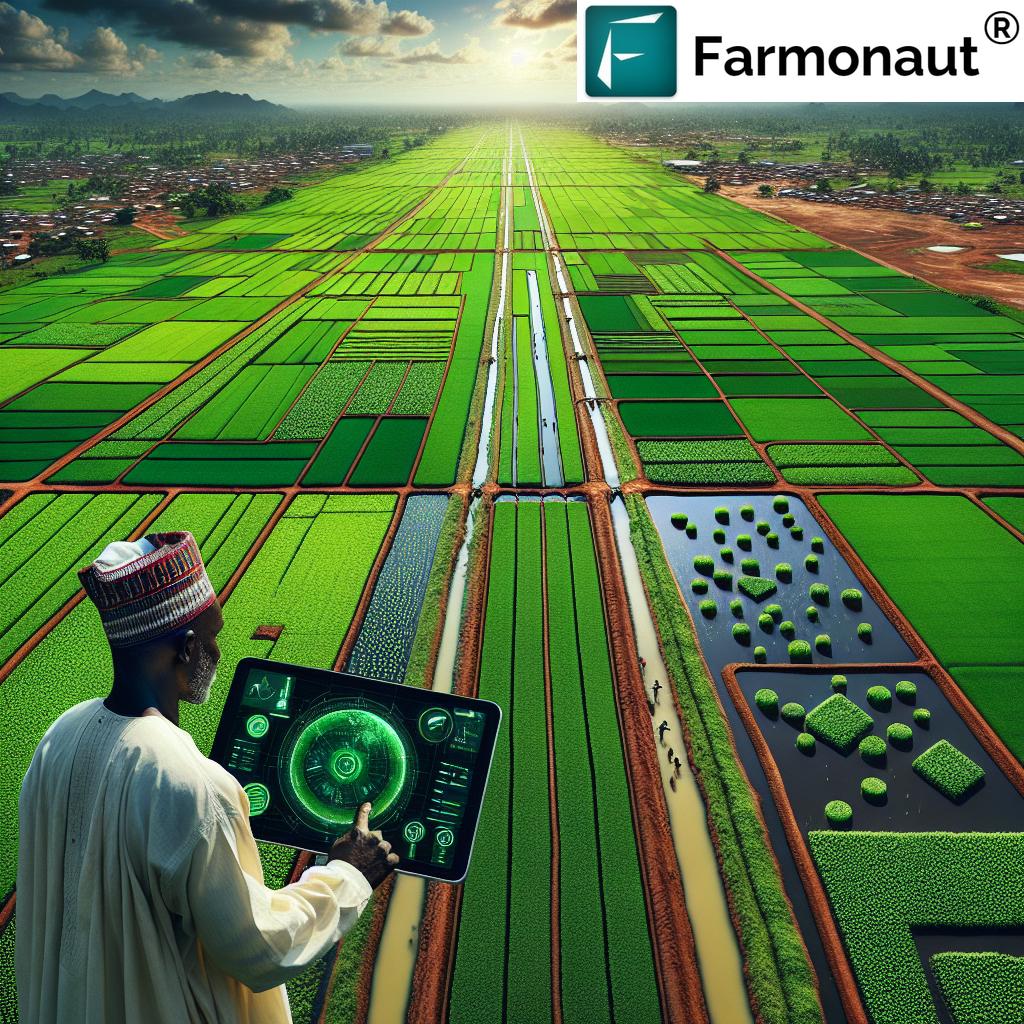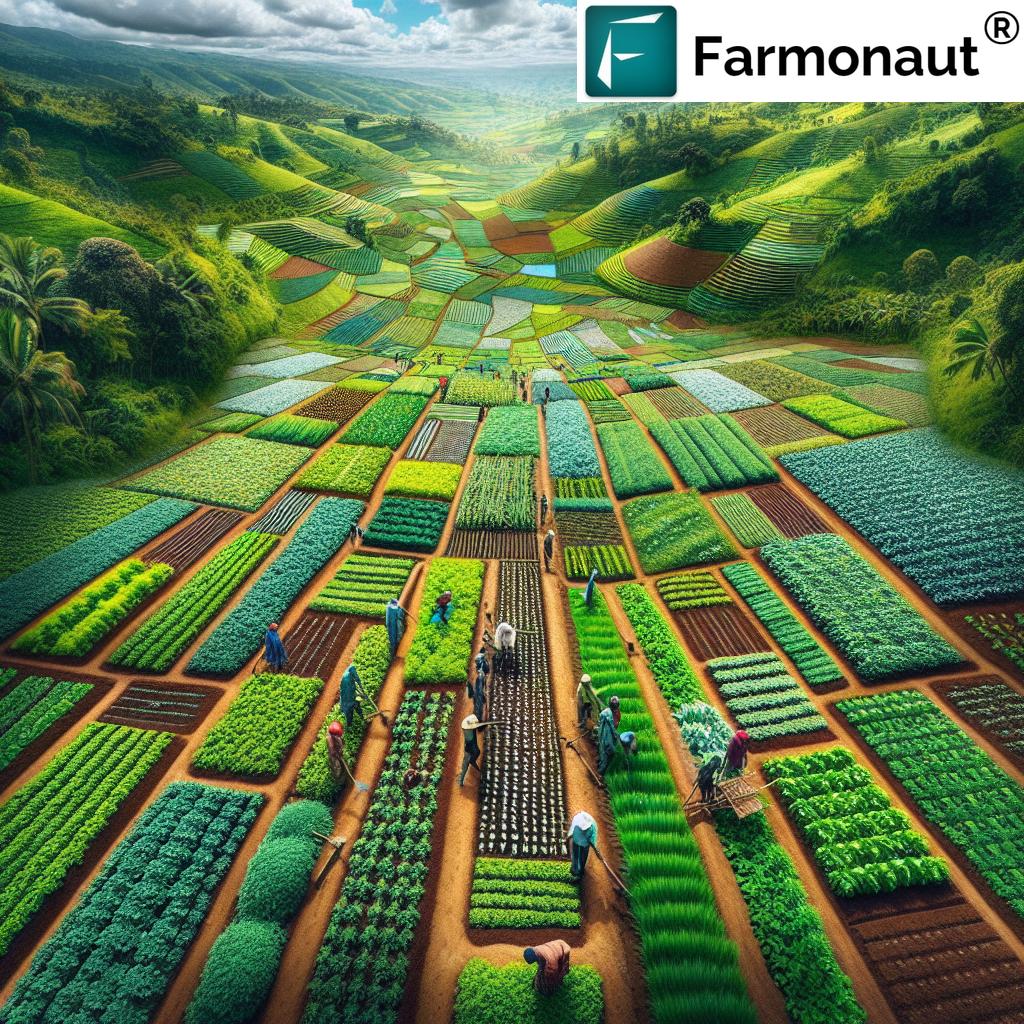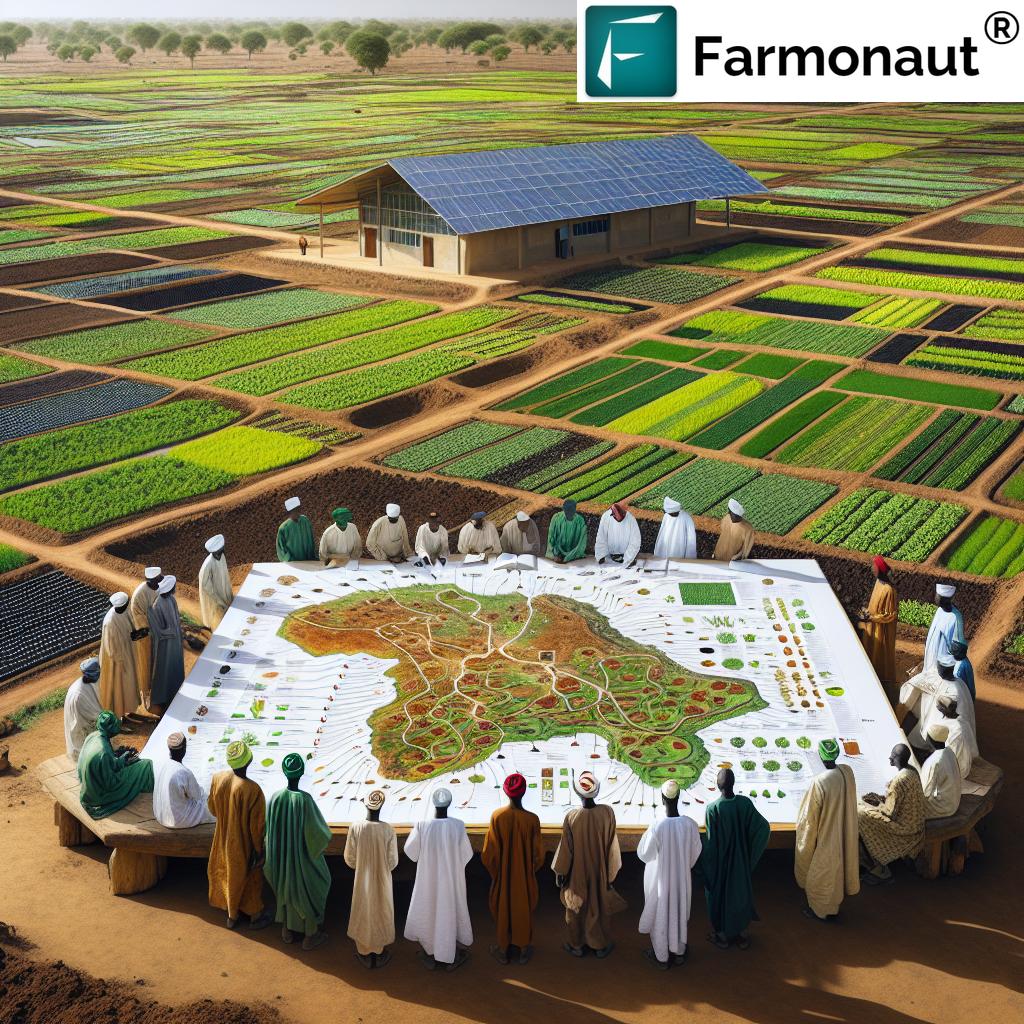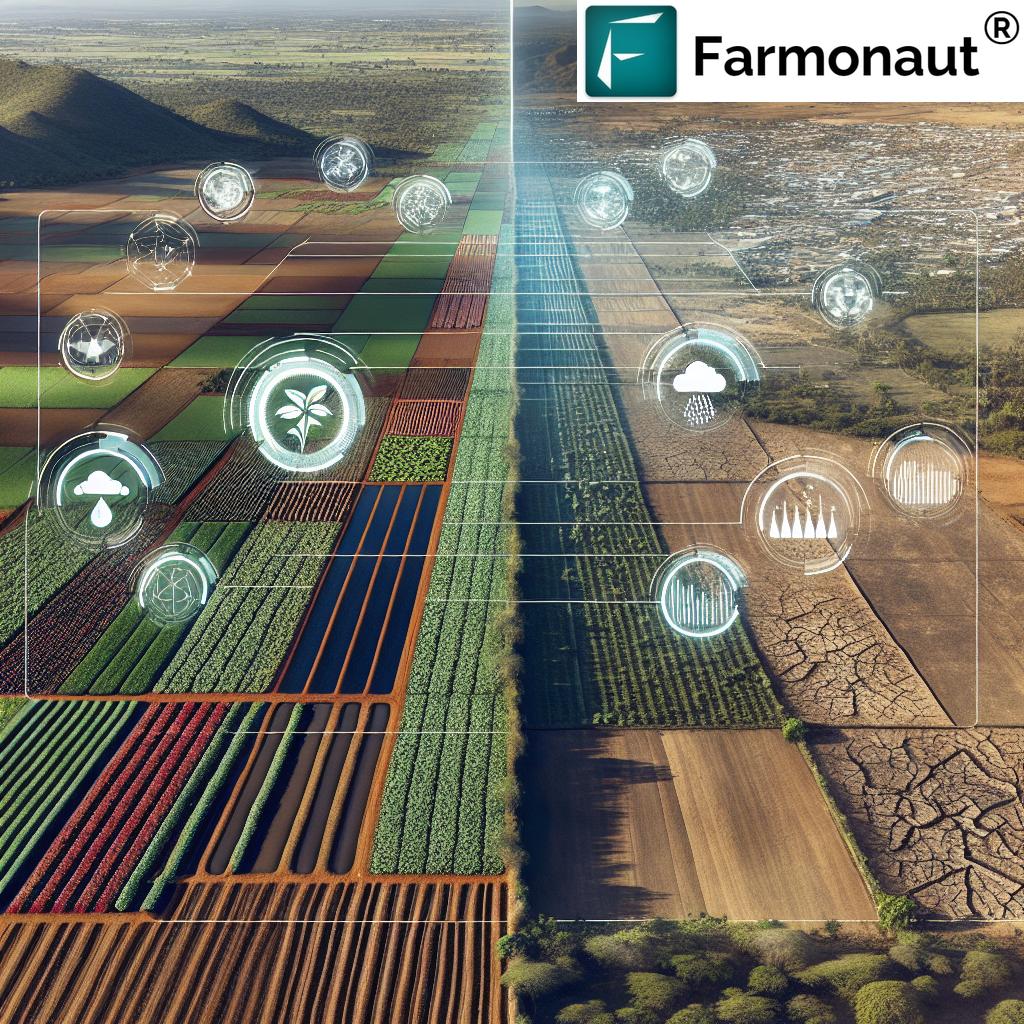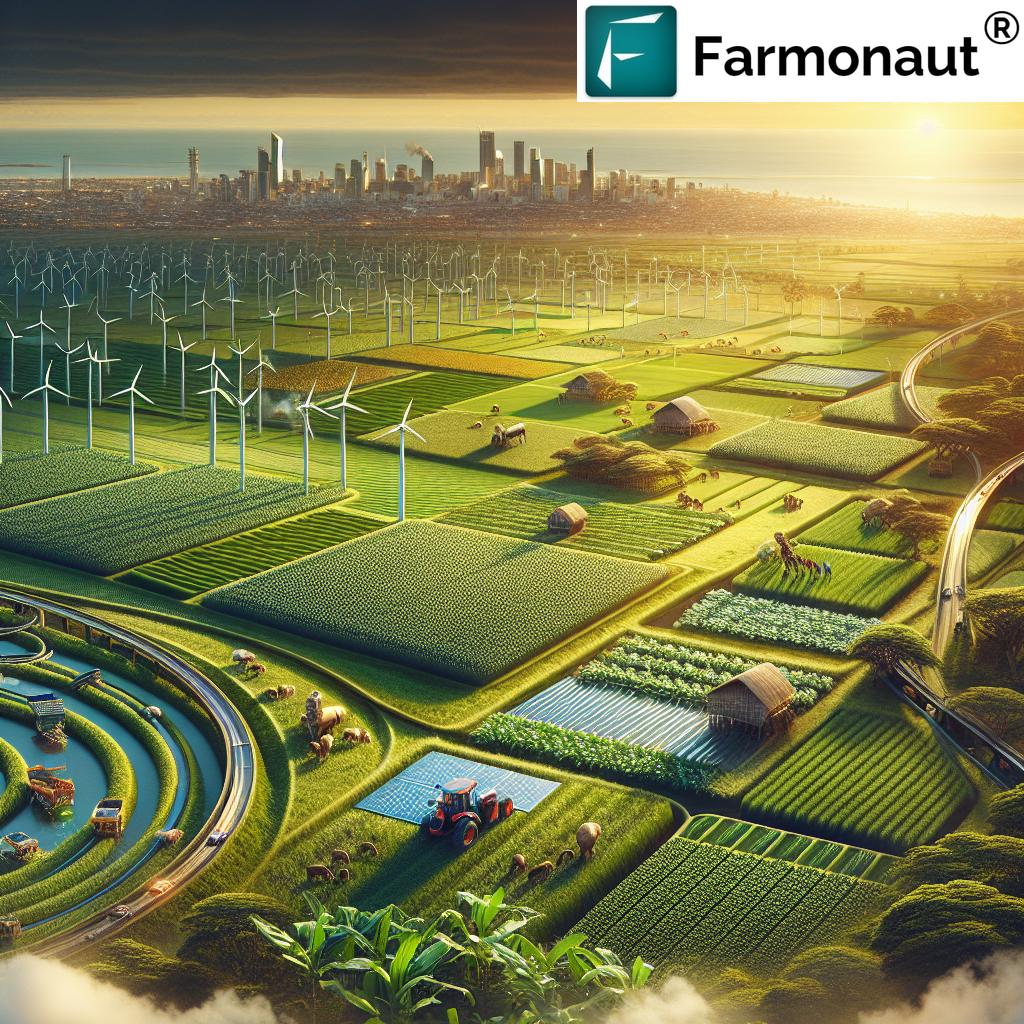EU Deforestation Regulation: Balancing Environmental Sustainability and Smallholder Farmer Livelihoods in Vietnam and Africa
“The EU Deforestation Regulation impacts millions of smallholder farmers in Vietnam and Africa, reshaping global agricultural practices.”
In recent years, the global community has increasingly recognized the urgent need to address deforestation and promote sustainable agriculture practices. At the forefront of this movement is the European Union’s Deforestation Regulation (EUDR), a groundbreaking legislation that aims to reshape the landscape of international agricultural supply chains. As representatives of Farmonaut, a company dedicated to empowering farmers through innovative technology, we believe it’s crucial to explore the far-reaching implications of this regulation, particularly for smallholder farmers in Vietnam and Africa.
The EUDR represents a significant step towards combating global deforestation by targeting key commodities that have been historically linked to forest degradation. Coffee and cocoa, two of the most important crops for smallholder farmers in Vietnam and Africa respectively, are at the center of this regulatory shift. As we delve into the complexities of the EUDR, we’ll examine how it aims to promote deforestation-free commodities while balancing the critical need for environmental sustainability in farming with the economic realities faced by producers.
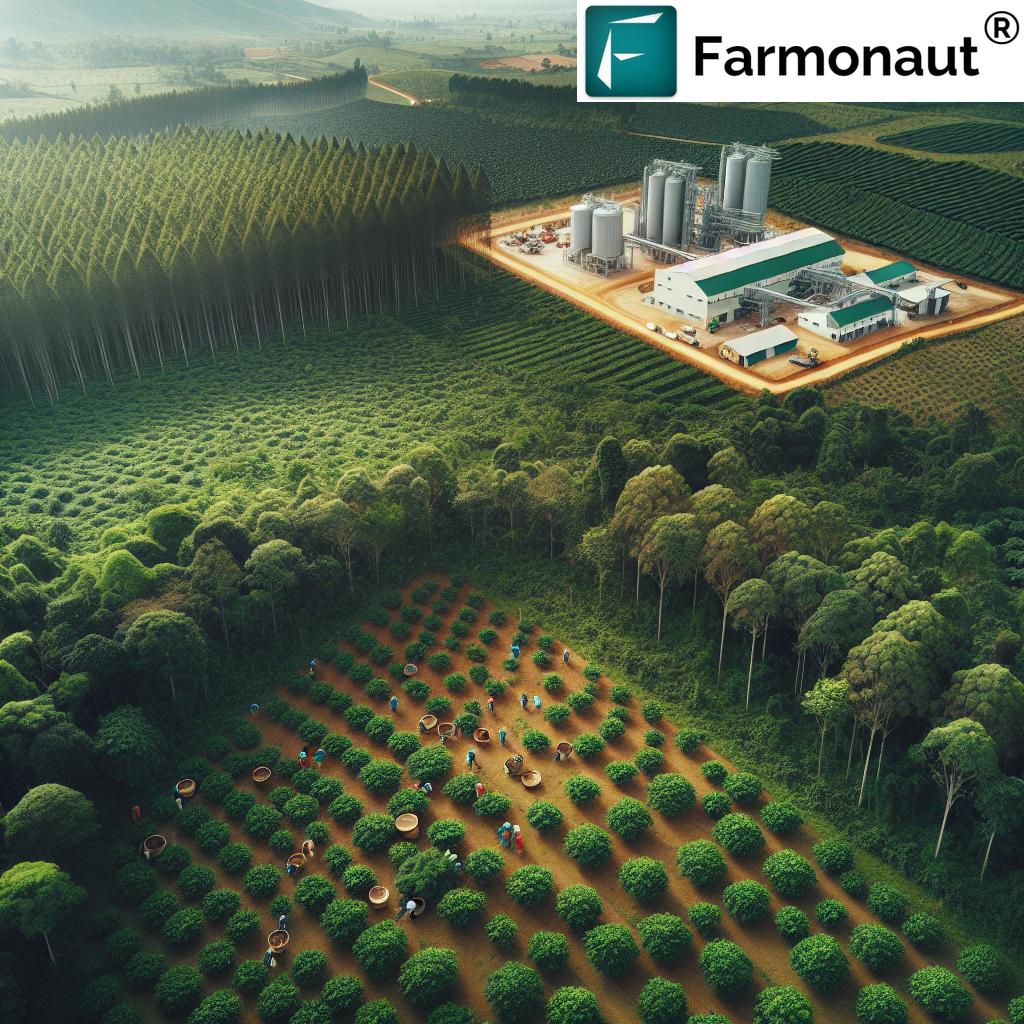
Understanding the EU Deforestation Regulation
The European Union Deforestation Regulation, set to come into full effect by the end of 2024, is a landmark piece of legislation designed to minimize the EU’s contribution to global deforestation through its consumption of certain commodities. The regulation targets products such as coffee, cocoa, palm oil, soy, beef, and timber, which are often associated with deforestation in their countries of origin.
Key aspects of the EUDR include:
- Due Diligence Requirements: Importers and large traders must conduct thorough due diligence to ensure their products are not linked to deforestation or forest degradation.
- Traceability: Companies must provide precise geographical information on where their commodities were produced, making supply chains more transparent.
- Risk Assessment: Operators must assess and mitigate risks in their supply chains related to deforestation.
- Penalties: Non-compliance can result in significant fines and exclusion from EU markets.
While the regulation’s intentions are undoubtedly positive for global forest conservation, its implementation presents significant challenges, especially for smallholder farmers in countries like Vietnam and across Africa.
Impact on Smallholder Farmers in Vietnam
Vietnam, known for its robust coffee sector, faces unique challenges in adapting to the EUDR. The country’s coffee industry, largely composed of smallholder farmers, is a critical component of its agricultural exports.
- Scale of Impact: With over 600,000 coffee-growing households, many operating on less than 2 hectares, the reach of the EUDR is extensive.
- Compliance Challenges: Many smallholders lack the resources and knowledge to implement traceability systems required by the EUDR.
- Economic Pressure: The costs of compliance could squeeze already tight profit margins for small-scale farmers.
However, the regulation also presents opportunities:
- Sustainable Practices: Adoption of more sustainable farming methods could lead to long-term productivity gains.
- Market Access: Compliant farmers may secure better access to premium EU markets.
- Environmental Benefits: Reduced deforestation can help preserve Vietnam’s rich biodiversity and contribute to climate change mitigation.
African Smallholder Farmers and the EUDR
Across Africa, particularly in West African countries like Côte d’Ivoire and Ghana, cocoa production is a cornerstone of rural economies. The EUDR’s impact on these regions is multifaceted:
- Diverse Landscapes: Unlike Vietnam’s more concentrated coffee sector, cocoa production in Africa spans multiple countries with varying levels of infrastructure and support systems.
- Poverty Concerns: Many cocoa farmers live below the poverty line, making investments in sustainable practices challenging.
- Deforestation Pressures: Historical links between cocoa expansion and deforestation make compliance particularly crucial in these regions.
Opportunities for African farmers include:
- Improved Farming Techniques: Implementation of agroforestry and other sustainable methods can enhance soil health and crop yields.
- Cooperative Strength: Farmer cooperatives can pool resources to meet EUDR requirements more effectively.
- International Support: Increased focus on sustainability may attract more development aid and private sector investments.
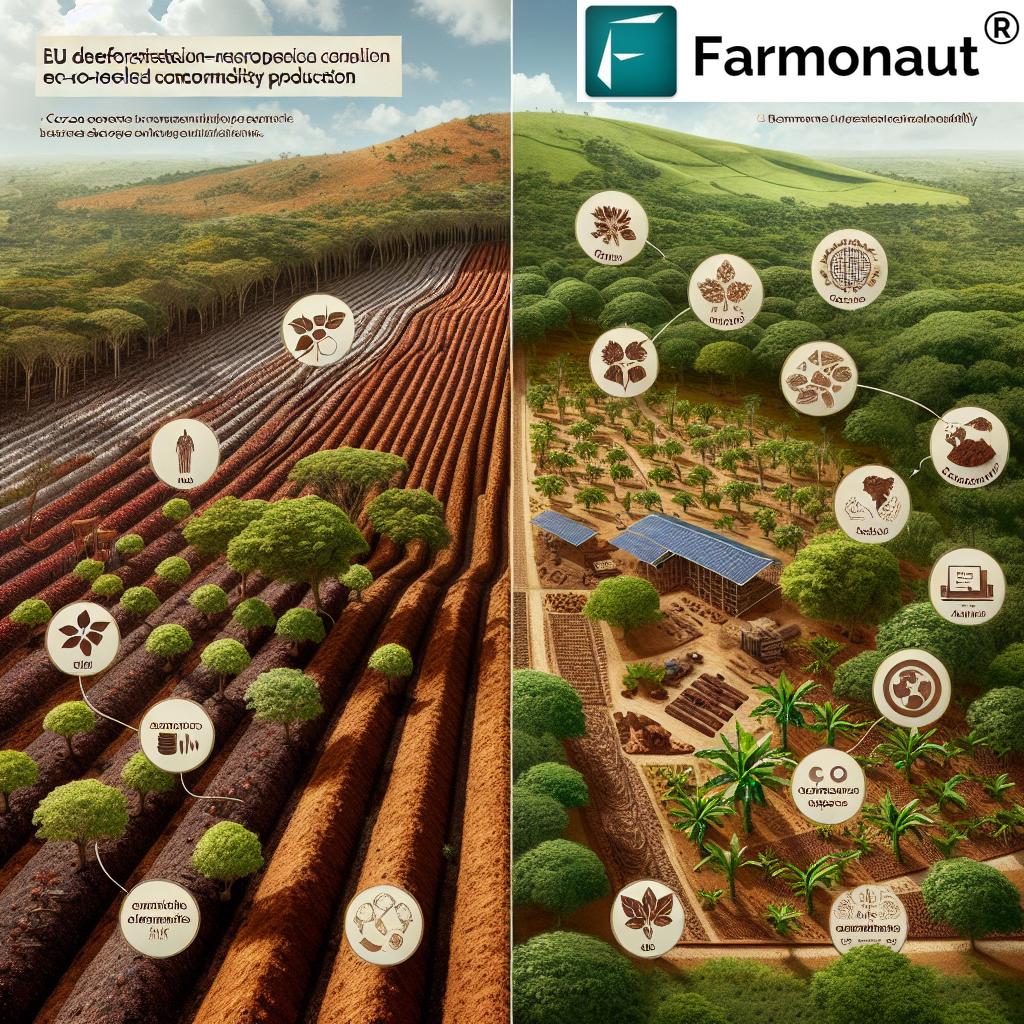
Comparative Analysis: Vietnam vs. Africa
| Aspect | Vietnam | Africa |
|---|---|---|
| Primary Affected Crops | Coffee | Cocoa |
| Estimated Number of Smallholder Farmers Impacted | ~600,000 | >2 million |
| Current Deforestation Rate (%) | 1.2% | 3.9% (West Africa) |
| Projected EUDR Compliance Costs (USD/hectare) | 150-300 | 200-400 |
| Potential Yield Increase with Sustainable Practices (%) | 15-25% | 30-50% |
| Available Government Support Programs | Moderate | Limited |
| Cooperative Farming Initiatives | Emerging | Well-established |
| Challenges in Implementation | Limited resources, knowledge gaps | Poverty, infrastructure deficits |
| Opportunities for Sustainable Agriculture | High-tech adoption, market access | Agroforestry, international support |
“Coffee and cocoa, two major commodities affected by EUDR, are produced by over 25 million smallholder farmers worldwide.”
Implementation Challenges of EUDR
The implementation of the EU Deforestation Regulation presents several challenges that stakeholders across the supply chain must address:
- Data Collection and Management: Gathering and maintaining accurate geolocation data for millions of small farms is a daunting task.
- Capacity Building: Smallholder farmers need significant support to understand and implement EUDR requirements.
- Cost Distribution: Determining who bears the costs of compliance—farmers, traders, or consumers—remains a contentious issue.
- Verification Mechanisms: Establishing reliable systems to verify deforestation-free claims is complex, especially in remote areas.
- Market Exclusion Risks: There’s a real danger that smallholders unable to meet EUDR standards could be excluded from valuable EU markets.
To address these challenges, multi-stakeholder collaborations are crucial. Governments, NGOs, and private sector actors must work together to create supportive frameworks that enable compliance without marginalizing vulnerable farmers.
The Role of Technology in EUDR Compliance
Innovative technologies play a pivotal role in facilitating EUDR compliance, especially for smallholder farmers. At Farmonaut, we recognize the potential of technology to bridge the gap between regulatory requirements and on-the-ground realities.
- Satellite Monitoring: Advanced satellite imagery can help track land use changes and verify deforestation claims.
- Blockchain for Traceability: Blockchain technology offers secure, transparent supply chain tracking from farm to consumer.
- Mobile Applications: User-friendly apps can help farmers record and share crucial data about their production practices.
- AI-Powered Advisory Services: Artificial intelligence can provide personalized recommendations for sustainable farming practices.
These technological solutions not only aid in compliance but also have the potential to improve overall farm management and productivity.
Explore Farmonaut’s innovative solutions:
The Promise of Cooperative Farming
Cooperative farming emerges as a powerful strategy for smallholders to meet EUDR requirements. By pooling resources and knowledge, cooperatives can:
- Share the costs of compliance and certification
- Implement group training programs on sustainable practices
- Negotiate better prices with buyers
- Access advanced technologies and expertise
In both Vietnam and Africa, strengthening existing cooperatives and forming new ones could be key to ensuring smallholder inclusion in EUDR-compliant supply chains.
Government and International Support Mechanisms
The success of the EUDR in promoting sustainable agriculture while safeguarding smallholder livelihoods depends heavily on supportive policies and international cooperation. Key areas of focus include:
- Financial Assistance: Governments and international organizations need to provide funding to help farmers transition to sustainable practices.
- Capacity Building Programs: Comprehensive training initiatives on sustainable agriculture and EUDR compliance are essential.
- Infrastructure Development: Investments in rural infrastructure can facilitate better market access and implementation of traceability systems.
- Policy Alignment: National policies in producing countries should be harmonized with EUDR objectives to create a coherent regulatory environment.
Countries like the Netherlands have taken a leading role in developing support mechanisms for smallholder farmers in Vietnam and Africa, recognizing the global nature of the challenge posed by deforestation.
Balancing Environmental Goals and Economic Realities
The core challenge of the EUDR lies in balancing urgent environmental protection with the economic realities of smallholder farmers. Strategies to achieve this balance include:
- Phased Implementation: Allowing for a gradual rollout of requirements to give farmers time to adapt.
- Differentiated Approaches: Tailoring compliance mechanisms to the specific contexts of different regions and farm sizes.
- Premium Pricing: Ensuring that the market rewards EUDR-compliant products with better prices to offset compliance costs.
- Alternative Livelihoods: Supporting diversification of income sources for farmers in high-risk deforestation areas.
By carefully considering these factors, the EUDR can become a catalyst for positive change rather than a barrier to smallholder participation in global markets.
The Future of Sustainable Agriculture Under EUDR
As we look to the future, the EUDR has the potential to transform global agricultural landscapes, particularly in Vietnam and Africa. We anticipate several key trends:
- Increased Adoption of Agroforestry: Integrating trees into farming systems can help meet EUDR requirements while improving soil health and biodiversity.
- Rise of Precision Agriculture: Technologies that enable more efficient use of resources will become increasingly important.
- Strengthened Local Value Chains: There may be a shift towards more local processing and value addition in producing countries.
- Enhanced Consumer Awareness: Greater transparency in supply chains could lead to increased consumer demand for sustainably produced goods.
These changes present both challenges and opportunities for smallholder farmers, requiring ongoing support and adaptation.
Conclusion: A Path Forward
The EU Deforestation Regulation represents a significant step towards combating global deforestation and promoting sustainable agriculture. However, its success hinges on the ability to implement it in a way that supports rather than marginalizes smallholder farmers in countries like Vietnam and across Africa.
By leveraging technology, fostering cooperatives, providing targeted support, and balancing environmental and economic needs, we can work towards a future where sustainable agriculture practices are the norm, not the exception. The journey ahead is complex, but with collaborative efforts across sectors and borders, we can create a more sustainable and equitable global agricultural system.
At Farmonaut, we remain committed to supporting farmers through this transition, offering innovative tools and insights to help navigate the changing landscape of global agriculture. Together, we can turn the challenges posed by the EUDR into opportunities for growth, sustainability, and prosperity for smallholder farmers worldwide.
Explore Farmonaut’s API solutions:
FAQ Section
- What is the EU Deforestation Regulation (EUDR)?
The EUDR is a legislation aimed at minimizing the EU’s contribution to global deforestation by regulating the import of commodities associated with deforestation, such as coffee, cocoa, and palm oil. - How does the EUDR affect smallholder farmers?
It requires farmers to provide detailed information about their production practices and ensure their products are not linked to deforestation, which can be challenging for smallholders with limited resources. - What are the main challenges in implementing the EUDR?
Key challenges include data collection, capacity building, cost distribution, and establishing reliable verification mechanisms. - How can technology help with EUDR compliance?
Technologies like satellite monitoring, blockchain for traceability, and AI-powered advisory services can aid in meeting EUDR requirements and improving overall farm management. - What role do cooperatives play in EUDR compliance?
Cooperatives can help smallholders share costs, implement group training programs, negotiate better prices, and access advanced technologies needed for compliance. - How are governments supporting farmers in meeting EUDR requirements?
Governments are providing financial assistance, capacity building programs, infrastructure development, and aligning national policies with EUDR objectives. - What are the potential benefits of EUDR for smallholder farmers?
Benefits include improved sustainable practices, potential yield increases, better market access, and long-term environmental benefits. - How does the EUDR impact differ between Vietnam and Africa?
While both regions face challenges, Vietnam’s coffee sector is more concentrated, whereas Africa’s cocoa production spans multiple countries with varying levels of infrastructure and support. - What is the future outlook for sustainable agriculture under EUDR?
The future likely includes increased adoption of agroforestry, rise of precision agriculture, strengthened local value chains, and enhanced consumer awareness of sustainable products. - How can smallholder farmers prepare for EUDR compliance?
Farmers can join cooperatives, adopt sustainable practices, leverage technology for farm management, and seek training and support from local and international organizations.







